Here are a few advice on thing you should not do, with substantiations from Google Video.
You should never add insult to injury. You should even more never add injury to injury:
Never mess around with old people:
Don't try to act smart:
30 August 2006
29 August 2006
Photochromic Spectacles
A few weeks ago, I noticed that even with my spectacles on, my right eye vision could not close in on distant objects. A visit to the optician has, fortunately, indicated that my right eye has decide to make a 25% leap from 200 degrees to 250 degrees instead of my worst fear that my eyeball is mutating into a button mushroom.
As I was browsing through the different spectacle frames, the friendly optician suggested to me on considering photochromic lenses, also known as Transition lenses due to the intense advertisement by the company of the same name. It costs about two times the price of a pair of normal lenses, which is the primary reason for the prolonged battle between the stingy and the inquisitive parts of me. Eventually, the latter won, so I ordered a pair.
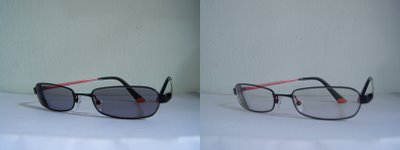
Quite frankly, the tint of the lenses is pretty unnoticeable by the wearer. In fact, it is quite hard to visually discern if it is the lenses or the sky that has darkened, unless I take my spectacles off and look at the lenses, or compare the spectacles view with the non-spectacles view.
In addition, the degree to which the lens darken is pretty minimal. This is a consequence, I believe, of Singapore's hot weather, since, in short, photochromism is less effective in warmer surroundings due to the fact that the "deactivation" of the tint is a process fuelled by heat (ultraviolet, on the other hand, activates the tint).
But looking at it from another angle, my spectacles is my new portable UV detector. If my vision turns blacker while indoors (such as in a lab), I should perhaps take caution. Maybe one day I should even use it to test out Wien's displacement law on blackbody radiation.
Yay! I can finally see my favourite colour!
As I was browsing through the different spectacle frames, the friendly optician suggested to me on considering photochromic lenses, also known as Transition lenses due to the intense advertisement by the company of the same name. It costs about two times the price of a pair of normal lenses, which is the primary reason for the prolonged battle between the stingy and the inquisitive parts of me. Eventually, the latter won, so I ordered a pair.

Quite frankly, the tint of the lenses is pretty unnoticeable by the wearer. In fact, it is quite hard to visually discern if it is the lenses or the sky that has darkened, unless I take my spectacles off and look at the lenses, or compare the spectacles view with the non-spectacles view.
In addition, the degree to which the lens darken is pretty minimal. This is a consequence, I believe, of Singapore's hot weather, since, in short, photochromism is less effective in warmer surroundings due to the fact that the "deactivation" of the tint is a process fuelled by heat (ultraviolet, on the other hand, activates the tint).
But looking at it from another angle, my spectacles is my new portable UV detector. If my vision turns blacker while indoors (such as in a lab), I should perhaps take caution. Maybe one day I should even use it to test out Wien's displacement law on blackbody radiation.
Yay! I can finally see my favourite colour!
27 August 2006
How Many Planets Are There in the Solar System?
In increasing distance from the Sun: Mercury, Venus, Earth, Mars, Jupiter, Saturn, Uranus and Neptune. In total, eight.
Yep, if you're not aware of recent astronomy news, it appears that Pluto, our eccentric fringe member in the Solar System, has been voted out of the Planetary Club, as a result of a re-definition of the term "planet".
Of course, the status of Pluto as a planet has been in question for a long time, mainly due to its small size, highly eccentric orbit and tilted plane of orbit. The reason why it was labelled as a planet is a long story, which can be simply summarised into two points. One, theoretical calculations based on Neptune's orbit inferred a presence of massive objects beyond, which was assumed to be a planet (though it turned out later to be more than a "planet"). Two, telescopes weren't that accurate in the 1930s when Pluto was discovered, so its size and orbit could not be determined accurately.
So, how will that change things? It won't. Pluto, as a planet or a dwarf planet (its new label), will continue to orbit eccentrically in an inclined plane no matter what we call it. Celestial objects couldn't be bothered with those mundane labellings that morons on the third planet from the Sun are so fascinated with.
Yep, if you're not aware of recent astronomy news, it appears that Pluto, our eccentric fringe member in the Solar System, has been voted out of the Planetary Club, as a result of a re-definition of the term "planet".
Of course, the status of Pluto as a planet has been in question for a long time, mainly due to its small size, highly eccentric orbit and tilted plane of orbit. The reason why it was labelled as a planet is a long story, which can be simply summarised into two points. One, theoretical calculations based on Neptune's orbit inferred a presence of massive objects beyond, which was assumed to be a planet (though it turned out later to be more than a "planet"). Two, telescopes weren't that accurate in the 1930s when Pluto was discovered, so its size and orbit could not be determined accurately.
So, how will that change things? It won't. Pluto, as a planet or a dwarf planet (its new label), will continue to orbit eccentrically in an inclined plane no matter what we call it. Celestial objects couldn't be bothered with those mundane labellings that morons on the third planet from the Sun are so fascinated with.
26 August 2006
Any Opportunist Mee Siam Seller Out There?
Just had this sudden thought: if some mee siam seller has some opportunist blood running in his veins, he'd be quick to introduce the new version of mee siam - Mee Siam with Hum.
It is not only a fresh idea; it will also draw quite an amount of curiosity due to PM's rally blunder as well as the buzz in the blogosphere. I predict that the stall will experience a sharp spike in business for the days to come. Why, one can even ask for "mee siam mai hum", making it a novel order in the hawker centre.
There is already some free publicity from mr brown's recent podcast. And I believe such a dish, if introduced, will spread like wildfire by bloggers.
Of course, it has to be some kind of promotional special, lasting maybe a fortnight or so. I doubt anyone likes hum in their mee siam, or else it would've been in there long ago. It's more like those kind of bubble tea craze, only that it has a shorter duration.
So, anyone here sells mee siam?
It is not only a fresh idea; it will also draw quite an amount of curiosity due to PM's rally blunder as well as the buzz in the blogosphere. I predict that the stall will experience a sharp spike in business for the days to come. Why, one can even ask for "mee siam mai hum", making it a novel order in the hawker centre.
There is already some free publicity from mr brown's recent podcast. And I believe such a dish, if introduced, will spread like wildfire by bloggers.
Of course, it has to be some kind of promotional special, lasting maybe a fortnight or so. I doubt anyone likes hum in their mee siam, or else it would've been in there long ago. It's more like those kind of bubble tea craze, only that it has a shorter duration.
So, anyone here sells mee siam?
The Post of Mystery and Unknown
Perhaps I have been a bit impatient... is it too early to take the next step, to make what is probably an unambiguous confirmation?
24 August 2006
Mee Siam Mai Hum
If you, like me, has been busy of late or does not have a habit of checking the mr brown show website, it is high time you listen to their recent podcast entitled with the innocent title of a harmless podcast.
Between this and the Bak Chor Mee podcast, I can't decide which is better.
Somehow I feel this will be better if it was dubbed as a full song... *hint* *hint*!
Between this and the Bak Chor Mee podcast, I can't decide which is better.
Somehow I feel this will be better if it was dubbed as a full song... *hint* *hint*!
The Itinerant
(This entry is quite overdue... I blame it on my over-packed schedule.)
The Itinerant is a book written by one of my army friends. It is a gentle blend of fantasy, mystery, as well as science fiction (which renders it immune to whatever scientific errors I might have issues with). Its style, for good or bad, deviates from much of the sci-fi books in the market, though, admittedly, I have not read enough of them to be certain how much this book differs.
However, what is certain is that grammatical or spelling errors are bound to surface to the reader. This is a result of the author self-publishing the book in an online publishing firm, Lulu. While this does away with the additional costs of professional editing and removes possible clouding as the book makes its way from the author to the readers, the price he has to pay is the existence of some typographical errors, as well as the loss of perhaps better ways of phrasing certain words or sentences.
In any case, it should not bother me or any other casual readers too much, since it is the storyline in the story that is important. This is how the synopsis goes:
It is a brave attempt for the author to break out of the standard mold of sci-fi books. In my opinion, not only is it brave, but the story is also fairly good for a first attempt. In general, the flow of the story runs pretty smoothly just like all conventionally-published books, though at certain points the flow turns a bit bumpy and dry. Nonetheless, as with most mystery books, once the reader reaches the I-should-stop-at-the-next-page-*flip*-or-maybe-the-next... point, the following pages will become a quicksand.
Another plus point about this story is that it is not overbearing on any particular genre. Though I do consider it somewhat a sci-fi, it does not have spaceships, hyperspace travel, ion cannons and stuff like these as its skeleton. Its elements of mystery may be stronger, but the focus is not on solving riddles and cracking codes. These different genres are mixed together to complement each other.
However, one area which I thought improvements can be made in is its action scenes. While it may be fine to some, my opinion is that these parts could been written in a quicker and more powerful style. Of course, I could be biased since I always favoured gongfu-styled fighting, partly a result of Louis Cha's wuxia novels and partly my preferred way of describing an action scene.
I do recommend this book for the above reasons as well as another: it is cheap: S$1. This book can be purchased online, either by digital form (PDF format) or printed version (which is much more expensive even before including shipping costs). Details can be found here.
The Itinerant is a book written by one of my army friends. It is a gentle blend of fantasy, mystery, as well as science fiction (which renders it immune to whatever scientific errors I might have issues with). Its style, for good or bad, deviates from much of the sci-fi books in the market, though, admittedly, I have not read enough of them to be certain how much this book differs.
However, what is certain is that grammatical or spelling errors are bound to surface to the reader. This is a result of the author self-publishing the book in an online publishing firm, Lulu. While this does away with the additional costs of professional editing and removes possible clouding as the book makes its way from the author to the readers, the price he has to pay is the existence of some typographical errors, as well as the loss of perhaps better ways of phrasing certain words or sentences.
In any case, it should not bother me or any other casual readers too much, since it is the storyline in the story that is important. This is how the synopsis goes:
Byrne has been wandering the globe since the day he can remember. Driven by an inexplicable restlessness that prevents him from settling down in one place for any significant period of time, he wanders aimlessly from town to town without knowing why. It seems like this is going to be the norm for the rest of his life until one day things take a turn for the surreal. His most recent landlord winds up dead, subject to a mysterious ailment known as the Dry Death. He meets an enigmatic man who offers him a job – a job that seems too good to be true. His body starts exhibiting some rather unusual changes. He comes across a strange and elusive lady who seems to be avoiding not just him but his employers as well. As the strangeness starts escalating day by day, Byrne will discover that there are more links to all these events than he initially thought, and in his quest for the truth, he will find not only his fair share of secrets and hidden agendas but the very reason for his itinerancy...
It is a brave attempt for the author to break out of the standard mold of sci-fi books. In my opinion, not only is it brave, but the story is also fairly good for a first attempt. In general, the flow of the story runs pretty smoothly just like all conventionally-published books, though at certain points the flow turns a bit bumpy and dry. Nonetheless, as with most mystery books, once the reader reaches the I-should-stop-at-the-next-page-*flip*-or-maybe-the-next... point, the following pages will become a quicksand.
Another plus point about this story is that it is not overbearing on any particular genre. Though I do consider it somewhat a sci-fi, it does not have spaceships, hyperspace travel, ion cannons and stuff like these as its skeleton. Its elements of mystery may be stronger, but the focus is not on solving riddles and cracking codes. These different genres are mixed together to complement each other.
However, one area which I thought improvements can be made in is its action scenes. While it may be fine to some, my opinion is that these parts could been written in a quicker and more powerful style. Of course, I could be biased since I always favoured gongfu-styled fighting, partly a result of Louis Cha's wuxia novels and partly my preferred way of describing an action scene.
I do recommend this book for the above reasons as well as another: it is cheap: S$1. This book can be purchased online, either by digital form (PDF format) or printed version (which is much more expensive even before including shipping costs). Details can be found here.
22 August 2006
Funny Commercials
Activities one after another has been driving me breathless these few days... Fortunately, after today, there should be more time for me to take a rest. I apologise for the lack of articles; I've got a number of thoughts in my mind, but had not the time to pen them down.
Meanwhile, do enjoy these hilarious commercials.
Meanwhile, do enjoy these hilarious commercials.
18 August 2006
Science and Religion
"This freedom to doubt is an important matter in the sciences and, I believe, in other fields."
- Richard Feynman
Science is erected upon the idea of fallibility. Uncertainty and doubt is always a key in science: a key to further developments, a key to greater knowledge and a key to a more precise theory. Although this was not apparent in the long history of science that was mired with philosophy and bogged down by authority, it became clear in the 20th century where old, firm, well established theories get overthrown by new, bizarre, radical ones, insofar as it becoming one of the tenets of the scientific method. In fact, science is, in a way, about overthrowing theories.
For example, Newton's laws formed the pillars of physics, but if there had been no doubt about it being the "truth", then the laws of relativity and electromagnetism would not have emerged, and we would have little of the knowledge and technological advances we enjoy today. Similarly, the geocentric model of the Universe would not have been replaced by the heliocentric model if Copernicus, Galileo and Kepler had not challenged the authorities.
On the other hand, religion is founded on faith. There lies this basis which you have to believe, no matter how you question it. To begin with, there is always the presence of a god that one has to accept without physical proof. Usually, if not always, this basis is held as a Universal truth, defended vigourously and seldom challenged from within, falling apart only when it is thoroughly inconsistent with other better established field of knowledge (a title only which science is worthy of claim).
This is the crucial difference between science and religion. Science allows for corrections, allows itself to be wrong, to be challenge, to fall so as to rise up stronger. However, it is worth mentioning that it is, perhaps, due to this uncertainty and shaky footing that some prefers a religious (or alternative) explanation over a scientific one.
And on that note, I shall now proceed on to some hypothetical situations.
Suppose one day a time machine is built. I should say that a time machine is not theoretically impossible, but at the current stage practically unachieveable because of technological limits. (For more information, read How to Build a Time Machine by Paul Davis. It is an excellent book targetted at the general audience.) Now observations of history are conducted with this time machine, such that they do not alter the past (so that we can avoid that irritating grandfather paradox and the likes of it).
Now, in this thought situation, some scientists, carrying detectors and video cameras and whatever equipment they have at their disposal, zoom back thousands of years into the past. When these scientists emerged from the time machine, they found themselves in totally nothing. Nothing. Then, as they are wondering if something had gone wrong with their apparatus, suddenly the sky began to glow. A blinding white light descended from above, so much so that they had to close their eyes.
A while later, the light faded, and the scientists open their eyes. To their shock, everything appeared: land, water, trees, animals, air, sun, stars, sky... and all appear as if they had been around for a long time. All these, recorded with the equipment, were brought back for analysis. Repeated tests were done, difference scientists went, more detectors were brought along, and the same thing happened at that very same time. And before that time, it was the same Nothing that surrounds them.
The scientists have no idea on how to explain this phenomenon. So they called for a convention in which the top brains and oddballs got together and debated at great lengths. Finally, they stepped out to the public and concluded that, for the lack of an alternative explanation, the general consensus is: a phenomenon similar to divine intervention has occurred. It appears that the Universe was created by a "higher" entity.
This is what I believe will happen in such an event due to the nature of science. Even though it may be hard to swallow, science will probably accept the reasoning of its age-old opponent.
Let's suppose another situation. Let's say that these scientists go back in time to around Jesus's supposed existence era. They went around searching in secret, listening to conversations of people. To their shock, they found that Jesus never existed, and that events such as the Crucifixion never occurred. They, just like in the hypothetical situation above, ran repeated tests, with more elaborate equipment as well as different people (with religious figures tagging along this time). But no matter how they probe, how they observe, how they searched, how they checked their equipment, it seems to appear that Jesus never existed.
(I must say that such a situation is highly unlikely, given the numerous independent accounts describing the same person and event, albeit each differing slightly. However, no matter how improbably an event is, it is not impossible.)
Now, being a non-believer of religion, such an event probably won't affect me at all. However, for those Christians who follow the Bible piously, will they be willing to accept the fact? That there is a major flaw in the book in which they place their basis on? In fact, broadening and generalising the argument, if one day science is able to produce evidence that contradicts any religion or major events in that religion, what will its followers do?
I do welcome one who has opinions to comment, since it is difficult for me to comprehend the thoughts of a religious person in such a situation. There is of course no right or wrong answer, and I must admit the situation I've set up is suffocating, but nonetheless I sincerely hope for opinions if you can afford it.
- Richard Feynman
Science is erected upon the idea of fallibility. Uncertainty and doubt is always a key in science: a key to further developments, a key to greater knowledge and a key to a more precise theory. Although this was not apparent in the long history of science that was mired with philosophy and bogged down by authority, it became clear in the 20th century where old, firm, well established theories get overthrown by new, bizarre, radical ones, insofar as it becoming one of the tenets of the scientific method. In fact, science is, in a way, about overthrowing theories.
For example, Newton's laws formed the pillars of physics, but if there had been no doubt about it being the "truth", then the laws of relativity and electromagnetism would not have emerged, and we would have little of the knowledge and technological advances we enjoy today. Similarly, the geocentric model of the Universe would not have been replaced by the heliocentric model if Copernicus, Galileo and Kepler had not challenged the authorities.
On the other hand, religion is founded on faith. There lies this basis which you have to believe, no matter how you question it. To begin with, there is always the presence of a god that one has to accept without physical proof. Usually, if not always, this basis is held as a Universal truth, defended vigourously and seldom challenged from within, falling apart only when it is thoroughly inconsistent with other better established field of knowledge (a title only which science is worthy of claim).
This is the crucial difference between science and religion. Science allows for corrections, allows itself to be wrong, to be challenge, to fall so as to rise up stronger. However, it is worth mentioning that it is, perhaps, due to this uncertainty and shaky footing that some prefers a religious (or alternative) explanation over a scientific one.
And on that note, I shall now proceed on to some hypothetical situations.
Suppose one day a time machine is built. I should say that a time machine is not theoretically impossible, but at the current stage practically unachieveable because of technological limits. (For more information, read How to Build a Time Machine by Paul Davis. It is an excellent book targetted at the general audience.) Now observations of history are conducted with this time machine, such that they do not alter the past (so that we can avoid that irritating grandfather paradox and the likes of it).
Now, in this thought situation, some scientists, carrying detectors and video cameras and whatever equipment they have at their disposal, zoom back thousands of years into the past. When these scientists emerged from the time machine, they found themselves in totally nothing. Nothing. Then, as they are wondering if something had gone wrong with their apparatus, suddenly the sky began to glow. A blinding white light descended from above, so much so that they had to close their eyes.
A while later, the light faded, and the scientists open their eyes. To their shock, everything appeared: land, water, trees, animals, air, sun, stars, sky... and all appear as if they had been around for a long time. All these, recorded with the equipment, were brought back for analysis. Repeated tests were done, difference scientists went, more detectors were brought along, and the same thing happened at that very same time. And before that time, it was the same Nothing that surrounds them.
The scientists have no idea on how to explain this phenomenon. So they called for a convention in which the top brains and oddballs got together and debated at great lengths. Finally, they stepped out to the public and concluded that, for the lack of an alternative explanation, the general consensus is: a phenomenon similar to divine intervention has occurred. It appears that the Universe was created by a "higher" entity.
This is what I believe will happen in such an event due to the nature of science. Even though it may be hard to swallow, science will probably accept the reasoning of its age-old opponent.
Let's suppose another situation. Let's say that these scientists go back in time to around Jesus's supposed existence era. They went around searching in secret, listening to conversations of people. To their shock, they found that Jesus never existed, and that events such as the Crucifixion never occurred. They, just like in the hypothetical situation above, ran repeated tests, with more elaborate equipment as well as different people (with religious figures tagging along this time). But no matter how they probe, how they observe, how they searched, how they checked their equipment, it seems to appear that Jesus never existed.
(I must say that such a situation is highly unlikely, given the numerous independent accounts describing the same person and event, albeit each differing slightly. However, no matter how improbably an event is, it is not impossible.)
Now, being a non-believer of religion, such an event probably won't affect me at all. However, for those Christians who follow the Bible piously, will they be willing to accept the fact? That there is a major flaw in the book in which they place their basis on? In fact, broadening and generalising the argument, if one day science is able to produce evidence that contradicts any religion or major events in that religion, what will its followers do?
I do welcome one who has opinions to comment, since it is difficult for me to comprehend the thoughts of a religious person in such a situation. There is of course no right or wrong answer, and I must admit the situation I've set up is suffocating, but nonetheless I sincerely hope for opinions if you can afford it.
15 August 2006
TalkingCock Does It Again
I know this is a bit late, but for those who don't read Talkingcock.com, they've apparently pulled off another good joke. Rare has it been that Talkingcock.com came up with brilliant stuff, and this is one smart one. It is not the satire that blows me off, but rather, it is the way the joke pops out into your face that's funny.
Malaysian Police Stumped by Pepper Attack on Dr. M
Enjoy!
Malaysian Police Stumped by Pepper Attack on Dr. M
Enjoy!
A Sleeping Second Day
This morning's lecture, set in the small cosy seminar room of S9A-02-01, was attended by thirteen students, not too far from the fourteen in the class roster. Techniques in Advanced Calculus is one module that maths majors cannot take, which leaves it open to other majors like me from physics and others from computing.
A general glance told me that this module is more like a build up from the calculus part of MA1505, but, perhaps due to the long day yesterday and the early morning hours together with the drone of the lecturer, I couldn't really quite focus on what he had to L'Hopital's Rule and Infinite Series. Nonetheless, I'm pretty certain I've studied it at one point of my life.
Well, the morning of the second day into the term, I've already had all the first lectures for my modules. Kinda weird...
A general glance told me that this module is more like a build up from the calculus part of MA1505, but, perhaps due to the long day yesterday and the early morning hours together with the drone of the lecturer, I couldn't really quite focus on what he had to L'Hopital's Rule and Infinite Series. Nonetheless, I'm pretty certain I've studied it at one point of my life.
Well, the morning of the second day into the term, I've already had all the first lectures for my modules. Kinda weird...
14 August 2006
First Day, Mad Rush
Hey, guess what? For some amazingly unknown reason, the lecture for three of the four level 2000 physics core modules (the fourth has no lecture) are lined up back to back, spanning from 0800 in the morning to 1400 in the afternoon, every Monday and Thursday. Since I'm taking them all this semester (which is not necessary, though I find it desirable if not for the mad schedule), this means that I have a stupendous stretch of lectures with negligible break in between.
On top of that, I had a political science module which just sits in neatly behind this chain of lectures on Monday, which essentially means a lecture marathon of eight hours straight. And it seems that my physics professors do not obey the general rule of ending lectures half an hour before the official ending time (the rational being that students can travel to their next lesson), it means my lunch essentially has to be bought and consumed in five minutes.
However, other than the rushed timing and the accursed sardine buses, I do find it quite manageable... at least for now. The first lecture, Electricity and Magnetism I by Dagomir, was rather mundane, but that's partly because he's going through what I've already known. Nonetheless, he has the tendency to add some jokes unexpectedly into his lectures, which sort of liven up the horribly chilling LT (made worse by the morning rain). At least I learnt that Spinelli is the Italian word for marijuana.
The second lecture is more of the standard NUS lecture that I've come to know of. It was Mathematical Methods in Physics I by Lim Hock Siah. It appears to be more on the difficult side, but given its importance, this means that the extra effort I may have to put in is worth it.
Following that comes Quantum Mechanics I by Oh Choo Hiap, who was also the Head of Department until he stepped down two months ago. One of the queer descriptions I've heard about him is that he is cute. And my, sure that word couldn't be more apt! How comical it was of him to stride into the LT and ask if school has started (and in case you're thinking that he's cracking a joke, I'm certainly getting the impression that he was serious). And since he's prepared almost nothing yet, he went on to give a brief description of the history of physics, quoting from memory the important dates like the year Newton's Principia was published. And of course, he has a couple of jokes up his sleeves that he weaves into his lecture to spice things up.
After a mad rush to Arts, I arrived at the Government and Politics in Singapore lecture slightly late, but missed nothing important. And I must say I really love this module, since it raises thought-provoking questions that I've never even pondered upon in my life. Never mind that the reading material is thick as Young & Freedman's University Physics, I sincerely believe the time I spent is damn worth it!
Well, that's a lot for the first day of school. There's still another mathematics module tomorrow, but I do not expect much to report on it.
On top of that, I had a political science module which just sits in neatly behind this chain of lectures on Monday, which essentially means a lecture marathon of eight hours straight. And it seems that my physics professors do not obey the general rule of ending lectures half an hour before the official ending time (the rational being that students can travel to their next lesson), it means my lunch essentially has to be bought and consumed in five minutes.
However, other than the rushed timing and the accursed sardine buses, I do find it quite manageable... at least for now. The first lecture, Electricity and Magnetism I by Dagomir, was rather mundane, but that's partly because he's going through what I've already known. Nonetheless, he has the tendency to add some jokes unexpectedly into his lectures, which sort of liven up the horribly chilling LT (made worse by the morning rain). At least I learnt that Spinelli is the Italian word for marijuana.
The second lecture is more of the standard NUS lecture that I've come to know of. It was Mathematical Methods in Physics I by Lim Hock Siah. It appears to be more on the difficult side, but given its importance, this means that the extra effort I may have to put in is worth it.
Following that comes Quantum Mechanics I by Oh Choo Hiap, who was also the Head of Department until he stepped down two months ago. One of the queer descriptions I've heard about him is that he is cute. And my, sure that word couldn't be more apt! How comical it was of him to stride into the LT and ask if school has started (and in case you're thinking that he's cracking a joke, I'm certainly getting the impression that he was serious). And since he's prepared almost nothing yet, he went on to give a brief description of the history of physics, quoting from memory the important dates like the year Newton's Principia was published. And of course, he has a couple of jokes up his sleeves that he weaves into his lecture to spice things up.
After a mad rush to Arts, I arrived at the Government and Politics in Singapore lecture slightly late, but missed nothing important. And I must say I really love this module, since it raises thought-provoking questions that I've never even pondered upon in my life. Never mind that the reading material is thick as Young & Freedman's University Physics, I sincerely believe the time I spent is damn worth it!
Well, that's a lot for the first day of school. There's still another mathematics module tomorrow, but I do not expect much to report on it.
13 August 2006
The End Has Come
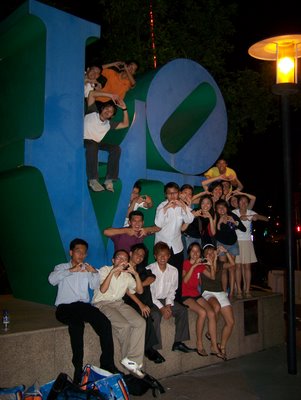
So here it is: the inevitable; the end of SOW (Science Orientation Week), the start of school. I will really miss SOW... miss all the fun, the freshies, the games, the madness, the passion, the cheering... SOW truly rocks!... I've never felt so young in such a long time.
I hope to join SOW07 once again, though I shall not place too much hope in that for three reasons. First, if my plan of going on exchange is on track, then I may not be around during this time next year. Second, given the success of SOW06, most of the seniors in SOW07 will probably be this year's freshies, just as it is for this year's seniors. Thirdly, even if there are places for year 3 seniors in SOW07, I doubt there will be many and they'll be better in the hands of other super-enthu seniors of the past few days.
Oh well... I really hope to join...
Anyway, for any freshie reading this, a super-big thanks to all of you!... again. You really made SOW06 a golden experience for me.
Thanks to the freshies!
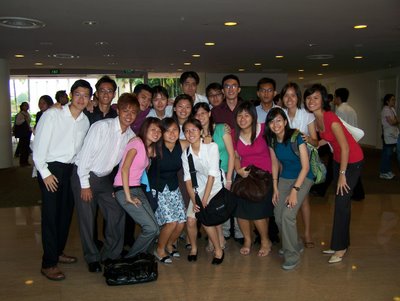
Thanks to the seniors!
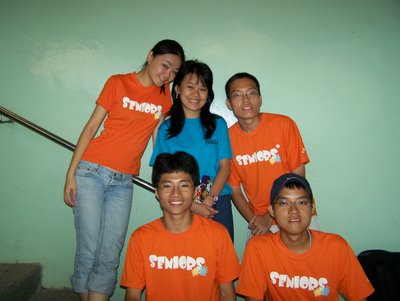
Thanks to Nightmare OG!
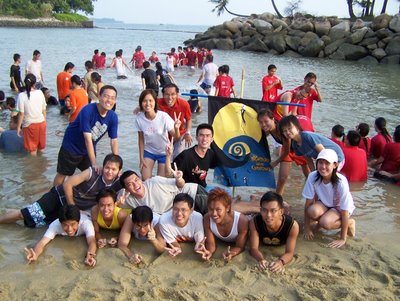
Thanks to Graveyard house!
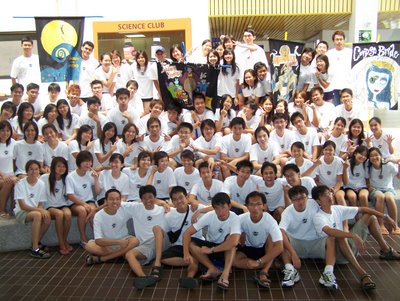
Thanks to Yuhan!

And thanks to Wee Tong who started it all!

Well, it's time to put down the copious enthusiasm and pick up the books once again, as well as resume blogging about more serious things.
May the FOS be with you.
12 August 2006
Water Animation
I apologise for the lack of updates in the recent days; Science Orientation Week has been keeping me very busy...
Anyway, no huge updates this time... just a little video that I've found interesting.
Enjoy!
Anyway, no huge updates this time... just a little video that I've found interesting.
Enjoy!
09 August 2006
The Post of Mystery and Unknown
Uncertainty has given way; there is little doubt now. The question is, when do I make the next move?
06 August 2006
SOW - Cruising at 5,000 Feet Above Sea Level

Wow! Finally, the long-awaited SOW (Science Orientation Week) has started. I have been in school since Wednesday to make some final preparations before the arrival of the freshies the next day, and it has been an absolute craziness until Saturday afternoon. I've wanted to pen my thoughts yesterday, but the lack of sleep is completely devastating to my ability to write.
The theme of SOW this year is Scinimation, and all the OG names are titles of cartoon or animation movies, grouped into four different houses. My OG is from the Graveyard house, and we've got the longest OG name: Nightmare Before Christmas.

Nightmare Before Christmas is quite a mouthful, so we're in short known as Nightmare. The freshies were a bit quiet on the first day, which really worried me deeply, for that'll indicate a failure on us senior's part to rouse them up. Fortunately, as if an overnight sleep settles some hidden disease, everyone was suddenly wild and delirious on the second day, and this blazing passion burnt all the way through till Saturday. For some reason I feel that this passion will flare with increasing magnitude to the fire of a sun in the days to come.
This is a photo of us and our buddy OG, Corpse Bride:
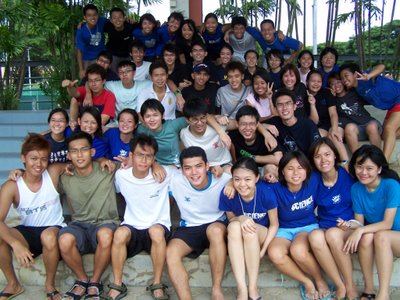
And the Graveyard house...
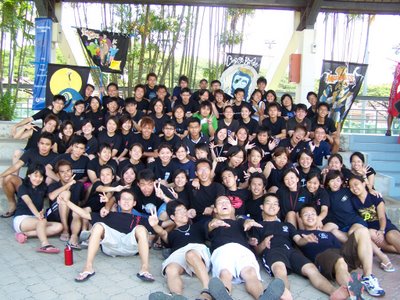
... on a walkabout:

Here's our charismatic house IC, Wenguang:
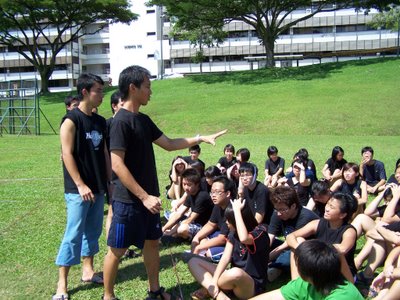
Well that's all for now. There'll be more thoughts, photos and perhaps even videos later (definitely there'll be - three days and the photos and videos have piled up to 1.4 GB).
One last thing before I sign off: looking at the contact list of my OG, it made me feel quite old... Dang, I'm the oldest around, even amongst the seniors (because the rest are Malaysians)...
One day pigs will fly!
02 August 2006
What's in a Name
I've just come to realise that the term "Feynman boson" is not exactly nonsensical as it seems. But before I delve into that, I shall briefly recount how I came to name this blog as such.
A couple of months back, when I decided, somewhat on the whim, to establish a blog, I was momentarily held back when I was required to decide on the name of the blog. Since I could not come up with anything sensible at that moment, my mind searched for absurdly creative names.
(You can skip the next paragraph if you wish.)
At that time, my statistical physics course has steered into spin-statistics theorem, touching on what a boson is. At the same time, our SPS project has ventured into scalar fields, more specifically, the Higgs boson. Now, the Higgs boson is a particle predicted in theory (due to symmetry), by Peter Higgs, but is yet to be observed experimentally. It is a very important particle in that it was supposedly responsible for giving mass to other particles.
The Higgs boson is obviously named after Peter Higgs. So I thought, Higgs has his boson. Since Richard Feynman is my favourite scientist, why not name a boson after him? And hence the name of this blog...
Recently, while looking up certain facts about Feynman on Wikipedia, I came across this paragraph:
Now, a boson is a particle which has integer spin, i.e. spin-0, spin-1, spin-2 and so on. Gravity, in quantum field theory, is described by a spin-2 particle known as the graviton (the equivalent of photon in electromagnetic interactions). In particle physics, a force is actually an exchange of these particles, so when there is electromagnetic or gravitational force between two bodies, these two bodies exchange photons or gravitons respectively.
I'm not sure if Feynman is the first person to derive Einstein field equations from quantum field theory. Now, assuming it is, this particle, this graviton, can then also be named after Feynman. And since gravitons are spin-2 particles, this meant that they are bosons. So Feynman bosons are actually gravitons.
Gravitons have never been observed experimentally. The currently accepted theory for gravity is Einstein's general theory of relativity. In it, gravity is actually not a force, but a result of the geometry of spacetime. There is no particle involved. On the other hand, in quantum field theory where gravitons are hypothesized to exist, there is currently no model that can meaningfully describe the gravitational force. It is the only particle in quantum field theory responsible for interactions not to be observed, which may be a hint that the quantum field theory may not be the ultimate theory that can unify all four fundamental forces.
The attempt at finding a model of quantum field theory that can describe gravity (and hence incorporate gravitons) is collectively known as quantum gravity, and so far the success has been limited. Right now, the superstring theory holds greater hope in this aspect.
Perhaps this is what "Feynman boson" means... barking up the wrong tree.
A couple of months back, when I decided, somewhat on the whim, to establish a blog, I was momentarily held back when I was required to decide on the name of the blog. Since I could not come up with anything sensible at that moment, my mind searched for absurdly creative names.
(You can skip the next paragraph if you wish.)
At that time, my statistical physics course has steered into spin-statistics theorem, touching on what a boson is. At the same time, our SPS project has ventured into scalar fields, more specifically, the Higgs boson. Now, the Higgs boson is a particle predicted in theory (due to symmetry), by Peter Higgs, but is yet to be observed experimentally. It is a very important particle in that it was supposedly responsible for giving mass to other particles.
The Higgs boson is obviously named after Peter Higgs. So I thought, Higgs has his boson. Since Richard Feynman is my favourite scientist, why not name a boson after him? And hence the name of this blog...
Recently, while looking up certain facts about Feynman on Wikipedia, I came across this paragraph:
After the success of quantum electrodynamics, Feynman turned to quantum gravity. By analogy with the photon, which has spin 1, he investigated the consequences of a free massless spin 2 field, and was able to derive the Einstein field equation of general relativity, but little more.
Now, a boson is a particle which has integer spin, i.e. spin-0, spin-1, spin-2 and so on. Gravity, in quantum field theory, is described by a spin-2 particle known as the graviton (the equivalent of photon in electromagnetic interactions). In particle physics, a force is actually an exchange of these particles, so when there is electromagnetic or gravitational force between two bodies, these two bodies exchange photons or gravitons respectively.
I'm not sure if Feynman is the first person to derive Einstein field equations from quantum field theory. Now, assuming it is, this particle, this graviton, can then also be named after Feynman. And since gravitons are spin-2 particles, this meant that they are bosons. So Feynman bosons are actually gravitons.
Gravitons have never been observed experimentally. The currently accepted theory for gravity is Einstein's general theory of relativity. In it, gravity is actually not a force, but a result of the geometry of spacetime. There is no particle involved. On the other hand, in quantum field theory where gravitons are hypothesized to exist, there is currently no model that can meaningfully describe the gravitational force. It is the only particle in quantum field theory responsible for interactions not to be observed, which may be a hint that the quantum field theory may not be the ultimate theory that can unify all four fundamental forces.
The attempt at finding a model of quantum field theory that can describe gravity (and hence incorporate gravitons) is collectively known as quantum gravity, and so far the success has been limited. Right now, the superstring theory holds greater hope in this aspect.
Perhaps this is what "Feynman boson" means... barking up the wrong tree.
Subscribe to:
Comments (Atom)





